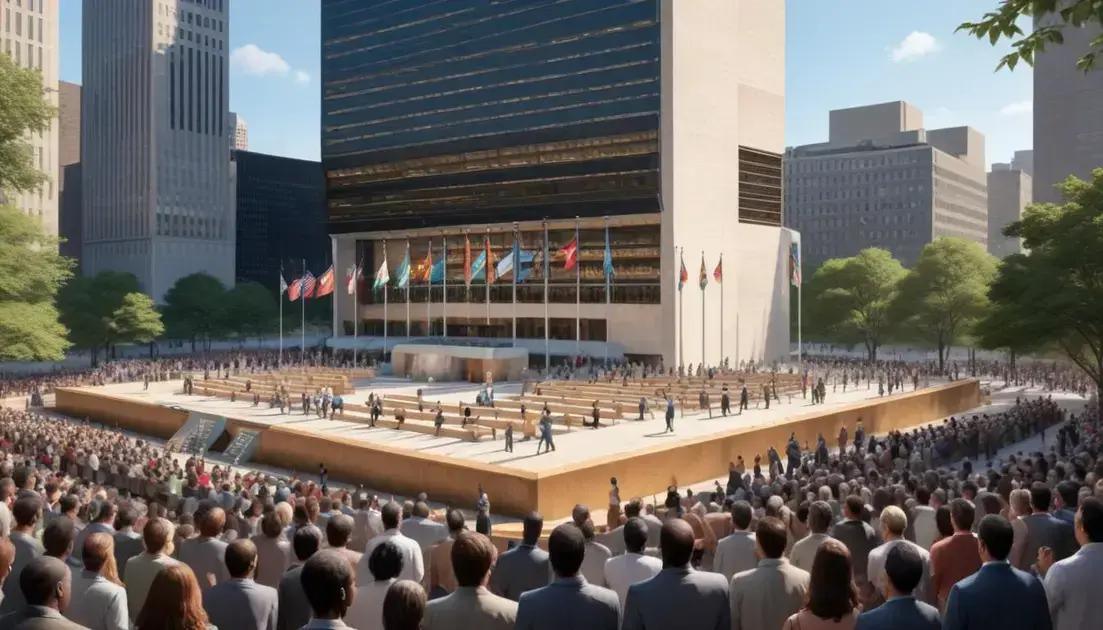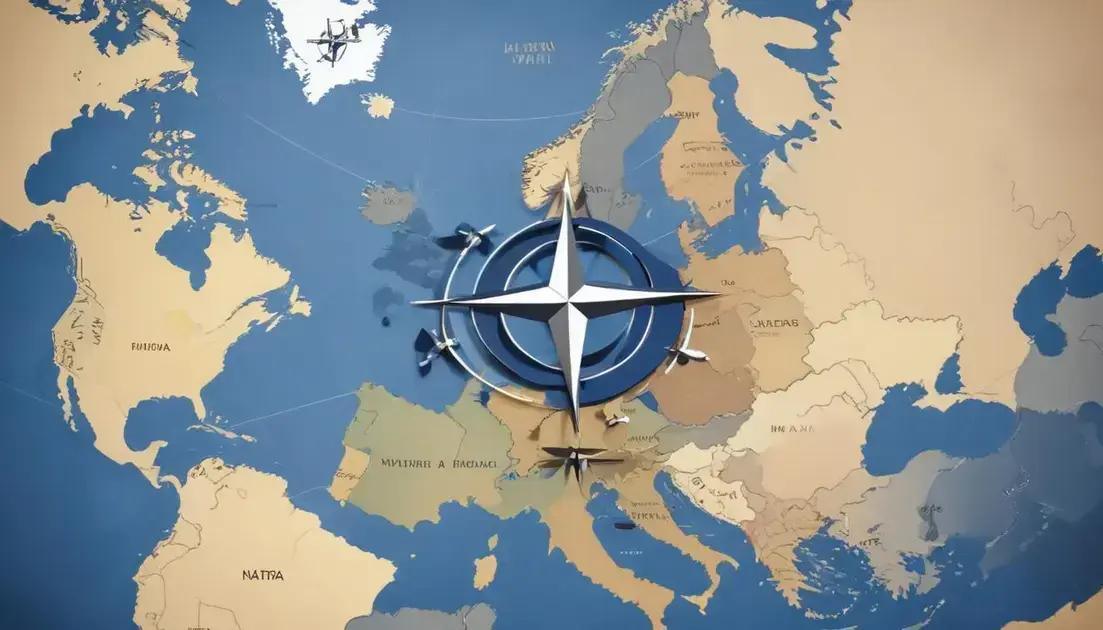
The UN and the Dream of Peace Amid Global Tension
The United Nations (UN) is essential for promoting global peace and security. Established after World War II, it focuses on addressing conflicts, humanitarian crises, and fostering diplomacy among nations. Key challenges include regional conflicts and political tensions, but the UN adapts through negotiation and multilateral talks. Its future lies in embracing change, strengthening global partnerships, and empowering communities to ensure collaboration for a better world.
United Nations plays a crucial role in promoting global peace, especially in our current tense political climate. What can we learn from its history?
Introduction to the UN’s founding principles
The United Nations was created in 1945 after World War II. Its main goal is to promote peace and security worldwide. Countries came together to solve problems without fighting. This idea is quite powerful and relevant today.
The Purpose of the UN
The UN aims to protect human rights and help nations work as a team. It provides a platform for dialogue. When nations face challenges, the UN encourages discussion over conflict.
Key Principles
Some key principles include respecting each country’s sovereignty. Each nation is treated equally, regardless of size or power. The UN also supports self-determination, allowing people to choose their political status.
UN Structure
The UN has different bodies, including the General Assembly and Security Council. The General Assembly discusses and makes recommendations on global issues. Meanwhile, the Security Council focuses on maintaining international peace and security.
Through these structures, the UN works to resolve conflicts and promote development globally. Understanding these founding principles is essential to recognizing the UN’s role today.
Historical context and challenges
Understanding the historical context of the United Nations is vital. The UN was established to prevent wars like those seen in the early 20th century. It emerged from the ashes of World War II when the world faced tremendous destruction and loss.
Major Events Leading to the UN
Before the UN, there were failed attempts to maintain peace, like the League of Nations. Conflicts would often blow up, leading to widespread suffering. This history shows the need for a stronger, more effective organization.
Current Global Challenges
Today, the UN faces numerous challenges. Ongoing wars and conflicts make international cooperation hard. Countries struggle to work together due to differing interests and ideologies. These challenges can make it difficult for the UN to achieve its goals.
Humanitarian Crises
Humanitarian crises also present obstacles. Millions face hunger, displacement, and poverty. The UN seeks to address these issues but often deals with limited resources and political hurdles.
Despite these challenges, the UN continues to play a crucial role in shaping global peace and security. Its history reminds us of the importance of cooperation in overcoming difficulties.
Current global tensions affecting peace
Current global tensions affect peace in many ways. Conflicts around the world often make headlines. From wars to trade disputes, these issues create uncertainty.
Regional Conflicts
Countries like Syria and Ukraine face ongoing battles. These conflicts lead to humanitarian crises, causing suffering for millions. Refugees flee their homes, seeking safety elsewhere.
Political Tensions
Political disagreements between nations also play a big role. Major powers often clash over territories and resources. This can escalate tensions and make negotiations harder.
Economic Factors
Economic troubles, like inflation and trade wars, further fuel conflicts. Nations may resort to aggressive actions out of desperation. These situations complicate international relationships.
The Role of Propaganda
Propaganda and misinformation can increase fear and misunderstanding. When countries don’t trust each other, dialogue becomes tough. Misinformation spreads quickly, making it hard to see the truth.
Despite these challenges, there are still efforts to promote peace globally. Organizations work together to find solutions and reduce conflicts.
The role of diplomacy in maintaining peace
is key to maintaining peace in the world. It involves countries talking and negotiating to solve problems. Instead of fighting, diplomacy encourages dialogue and understanding.
Negotiation and Compromise
In many cases, countries face disagreements. Through negotiation, they can find common ground. This often requires compromise, where both sides give up something to achieve peace.
The Power of Communication
Effective communication is vital. Diplomats work to build relationships between nations. They must listen closely and understand different perspectives to find solutions.
Multilateral Talks
Multilateral diplomacy involves many nations working together. Groups like the United Nations allow countries to discuss global issues. These discussions help prevent conflicts and foster cooperation.
Conflict Resolution
When tensions rise, diplomacy can help calm the situation. Skilled diplomats can mediate disputes and promote peaceful solutions. Their efforts can stop conflicts from escalating.
In conclusion, diplomacy remains a powerful tool for maintaining peace. By working together, nations can strengthen relationships and create a safer world.
Conclusion: Future prospects for the UN
The future prospects for the United Nations depend on its ability to adapt. As the world changes, the UN must find new ways to address global challenges. This involves staying relevant in a shifting political landscape.
Embracing Change
To remain effective, the UN needs to embrace change. This includes adjusting policies and strategies to reflect current issues. Flexibility will help the UN meet the needs of different nations.
Strengthening Global Partnerships
Building strong partnerships is another key area. The UN can enhance its impact by collaborating with various organizations. Working together can lead to meaningful solutions for global problems.
Focus on Sustainable Development
The UN aims to promote sustainable development worldwide. This includes addressing poverty, inequality, and climate change. Focusing on these issues will ensure a better future for all.
Empowering Communities
Empowering local communities is essential. The UN should involve citizens in decision-making processes. When people feel included, they are more likely to support peace initiatives.
In summary, the UN’s future prospects hinge on adaptability, collaboration, and community empowerment. As it faces new challenges, these strategies will guide its path forward.
Conclusion
In conclusion, the United Nations plays a vital role in promoting peace and cooperation globally. Despite facing many challenges, its ability to adapt and embrace change is crucial for the future. By strengthening partnerships and focusing on sustainable development, the UN can help improve lives around the world.
Empowering local communities also makes a difference. When people feel they have a voice, they are more likely to support peace efforts. Moving forward, the UN must continue to adapt and innovate as it addresses the issues of tomorrow.
Ultimately, the success of the UN lies in its commitment to fostering understanding and collaboration among nations. By working together, we can build a safer and more peaceful world for everyone.


